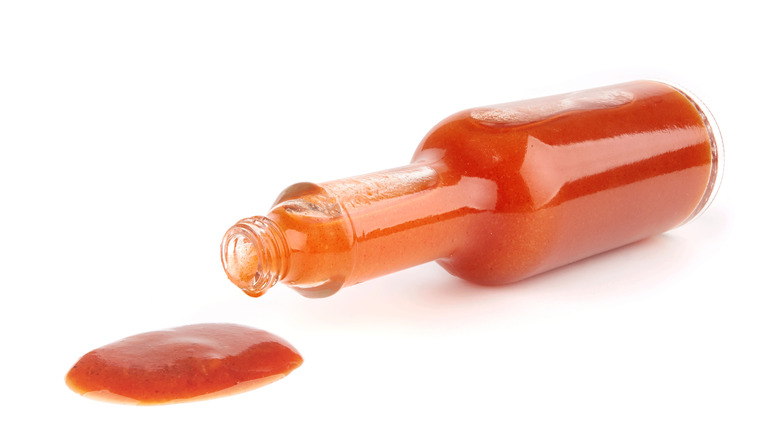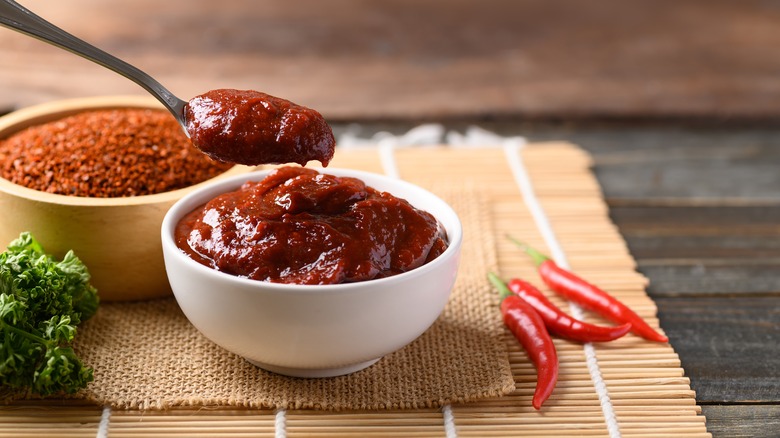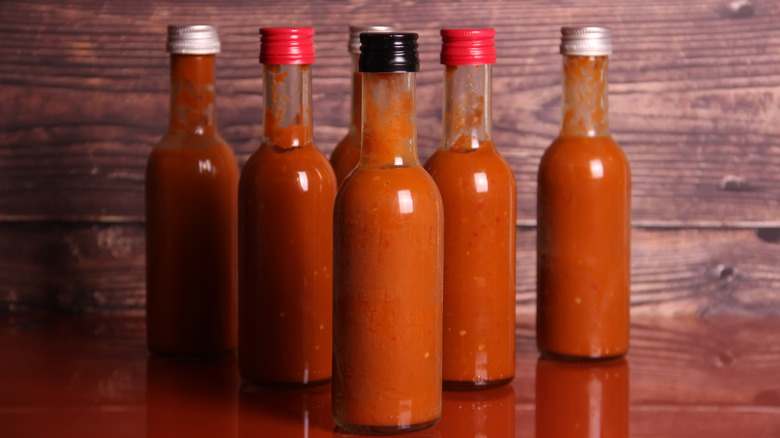The Label Detail To Look For Before You Store Your Hot Sauce
If you like to break a sweat or enjoy the tingling sensation on your tongue when it comes to eating, chances are you have dozens of hot condiments in your refrigerator or pantry. From harissa to Tabasco, there are many ways to spice up a dish.
Hot sauce is believed to have been invented by the Aztecs in the Americas (via Pepper Scale). Today, the condiment is enjoyed all over the world. The hot sauce industry is booming — it's projected to grow to more than $4 billion by the end of the decade, according to Fortune Business Insights. Global spicy condiments, such as sriracha and gochujang, have gained popularity in the United States, which The Wall Street Journal accredits to "growing immigrant populations, thrill-seeking food shows, pop culture references and diners' increasing familiarity with global cuisines."
Despite all hot sauces being undeniably spicy, not all hot sauces are created equal. When figuring out where to store hot sauce, a look through the label can determine whether your hot sauce stays fresh or quickly spoils.
Check the ingredients
Depending on the ingredients, hot sauce generally is safe to store at room temperature. Vinegar and, of course, peppers are commonly found in the condiment, which benefits the sauce more than you think. Hot sauce contains capsaicin, a chemical compound found in peppers that gives them their signature kick. According to recent research published in the European Journal of Microbiology and Immunology, capsaicin was shown to slow and deter bacterial growth.
Vinegar is acidic and acts as a natural preservative. According to experts (via Epicurious), it's generally safe to store hot sauce on the shelves if vinegar is the first ingredient listed. Other spicy condiments, such as salsa should be fine to store at room temperature as they contain similar ingredients. According to the National Center for Home Preservation, acidic ingredients found in salsas, like vinegar and lemon juice, naturally preserve them. But for hot condiments that don't contain high amounts of vinegar, Pepper Scale recommends refrigerating them, such as oil-based spicy condiments and fruit-based salsas, and chutneys.
The fridge is hot sauce's best friend
Refrigerating hot sauce only does more good than harm, according to Pepper Scale. It can help preserve its color and freshness. Popular hot sauce brands, like Frank's Red Hot, suggest storing its sauce in the fridge for longer freshness. Tapatío Hot Sauce can be stored in the pantry for up to two years, according to its website. Furthermore, the founder of Shaquanda's Hot Pepper Sauce, Andre Springer, tells Epicurious that he will refrigerate anything containing an "all-natural" label.
The U.S. Department of Agriculture's FoodKeeper website and app have general guidelines on storing hot sauce and other spicy condiments. Store-bought hot sauce is safe to eat within six months when stored at room temperature but can last longer when refrigerated. Salsas are generally safe to be kept in cabinets, but storing them in the fridge keeps them fresh longer.
Like most perishable products, hot sauce labels should have storage directions and expiration dates, which the U.S. Food and Drug Administration recommends following. For peace of mind though, occasionally check your condiments. If your hot sauce is looking or smelling a little strange, it's best to throw it out.


